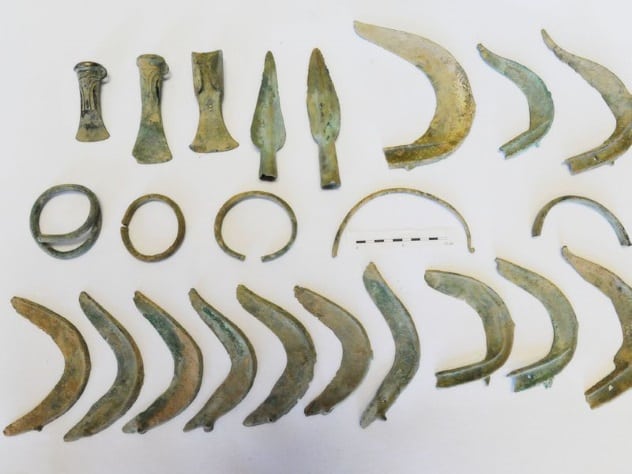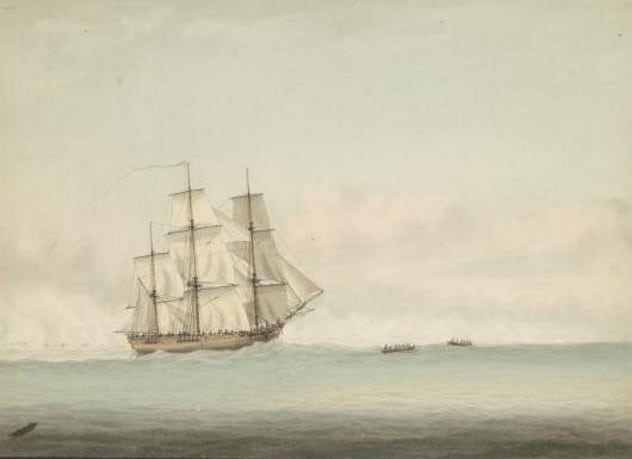This week, we learn about two plucky pensioners who show us that age is just a number. On the younger side of the spectrum, students do some pretty cool things, such as sending a cleaner on his dream vacation or getting an innocent man out of prison. On a grander scale, Germany launches the first hydrogen trains, and marine archaeologists try to find the HMS Endeavour.
10 Germany Launches First Hydrogen Trains
The first hydrogen-powered trains in the world were launched on Monday on a 100-kilometer (62 mi) route in Northern Germany. The two light blue Coradia iLint trains were built by French company Alstom, the maker of the TGV. They will travel between four stops, with a hydrogen refueling station installed in the town of Bremervoerde. Alstom CEO Henri Poupart-Lafarge said that the zero-emission trains are ready to enter serial production and promised to deliver another 14 of them to the Lower Saxony state by 2021.[1] When it comes to being environmentally friendly, there are few alternatives better than hydrogen power. Hydrogen and oxygen go in, and only steam and water come out. Fuel cells produce electricity and store it in ion lithium batteries capable of holding a full charge good for a range of 1,000 kilometers (600 mi). Alstom said that several other European countries have already expressed interest in their trains, with France stating that they will run their first hydrogen train by 2022.
9 A Nonagenarian Takes To The Skies
A 94-year-old World War II veteran completed his first skydive since parachuting into Normandy 74 years ago. When he was 20 years old, Harry Read was a wireless operator who took part in D-Day alongside the Parachute Brigade. For this, he was named a Chevalier with the Legion of Honor. Almost seven and a half decades have passed since he last jumped out of a plane. This time, he was inspired following a visit to the battlefields of Normandy. He did it to help raise money for the Salvation Army to fund its work fighting trafficking and modern slavery in the UK.[2] Comparing his two skydives, Harry said they were significantly different. Back in Normandy, the goal was to get on the ground as fast as possible, so the jump only lasted about 30 seconds. This time, the veteran took to the skies and plunged over 3,000 meters (10,000 ft) before landing on the Old Sarum Airfield in Salisbury, Wiltshire. Read was joined on his skydive by his two granddaughters and great-grandson. He plans to repeat the feat next year to mark the 75th anniversary of D-Day.
8 A Brawl At The Bookies
Speaking of intrepid pensioners, this is a story of an octogenarian who fought off three criminals who tried to rob his local bookmaker. Last Saturday, 83-year-old Denis O’Connor was spending the afternoon at Bar One Racing in Glanmire, County Cork, Ireland. Three masked men burst into the bookies. Two of them were wielding hammers, while the third was brandishing a shotgun. The armed thief was on crowd control while the other two went behind the counter to confront shop manager Tim Murphy. Undeterred by the fact that he had a weapon pointed at him, Denis went to help the shop manager and began fighting with one of the robbers. The pensioner got the best of him, and the criminal fled while Murphy tackled the other hammer-carrying thief.[3] The robber with the shotgun made his getaway when he saw his partner running. Luckily for Denis and everyone else involved, the shotgun-wielder brought the weapon more for intimidation and seemed unwilling to actually pull the trigger. According to O’Connor, at first he thought the whole thing was a stunt or a gag. By the time he realized it was serious, he was already marching toward one of Murphy’s attackers. The whole thing was captured on camera, and now he is being hailed a hero. Denis said his wife wasn’t very pleased but was still proud of his actions.
7 Artists Strive To Change Attitudes Toward Mental Health
Forty young artists from across Europe are joining forces to create a mural that will tackle mental health stigmas which plague the Spanish town of Sant Boi. Located 20 kilometers (12 mi) from Barcelona, Sant Boi de Llobregat is mainly known for two things: its artistic heritage and its large mental health hospital. Local artist Dani Sanchez wants to change the perception of the community so that it will no longer be viewed as “the town of the loonies.”[4] To that end, he and 39 other artists have started a project which will revamp the hospital’s degraded, ugly walls and cover them in murals which challenge the taboos of mental health. The images center around the concept of carpets which appear draped over the walls—half of them hang on the outer side, and the other half are inside. This is meant to entice residents to walk inside the hospital gardens. These have been open to the public since 2010 to forge a stronger relationship between patients and locals.
6 We Named The Dog Monty
Monty the dog has been hailed as a “good boy” after uncovering dozens of Bronze Age artifacts during a walk with his owner. Monty and his master, Mr. Frankota, were out for a stroll in a field outside the Czech village of Kostelecke Horky. The proficient pooch detected something and started pawing at the ground, revealing a few metallic objects. After a round of digging, the duo uncovered a cache of over 20 ancient relics which included 13 sickles, three axes, two spear points, and several bracelets.[5] Local archaeologists took the artifacts and dated them to the Urnfield period, roughly 3,000 years ago. The name is derived from this culture’s practice of cremating the dead and keeping their remains in urns. Martina Bekova, archaeologist at the Museum and Gallery of Orlicke Hory, said that they usually only find fragments of Urnfield objects scattered here and there. An intact cluster is a rare discovery, and it is most likely linked to some kind of ritual or sacrifice.
5 Noah’s Bus
Natural disasters provide good opportunities for people to show their true nature. Some are quick to take advantage of tragedy and loss for their own gain, while others act selflessly to help those in need. As you might expect, this entry focuses on the latter, specifically on a modern-day Noah who used a school bus to get animals out of the way of the flood. As Hurricane Florence was making its way toward the US East Coast last week, Tony Alsup got in his yellow bus and drove from his home in Greenville, Tennessee, toward the Carolinas. His goal was to stop at the animal shelters that might be in the way of the storm and rescue whatever creatures might still be left behind.[6] He shared his adventures on social media to help find people to foster and adopt his traveling band of misfits. As of this writing, Tony is still scouting areas ravaged by the hurricane and transporting animals to a safe shelter in Foley, Alabama.
4 Students Send Cleaner On Dream Vacation
A cleaner working for the University of Bristol got to enjoy a holiday in Jamaica after hundreds of students crowdfunded his trip. Back in June, medicine student Hadi Al-Zubaidi started a crowdfunding page to send university cleaner Herman Gordon to visit his family in Jamaica for the first time in a decade. He described Herman Gordon as “the jolliest man I have ever met.”[7] Clearly, many of his fellow students agreed. Roughly 230 people donated, and the £1,500 goal was reached within a week. A video of the cleaner accepting his gift went viral, as many people were touched by Herman’s friendly, outgoing nature. Now, Herman was able to go on his dream vacation. He and his wife, Denise, enjoyed a weeklong stay at the five-star Montego Bay Resort. Pictures of the couple’s trip were shared on a Bristol Facebook page called Bristruths. Herman said that “everybody will see this and think that I’m a trillionaire.”
3 Cyclist Smashes Two World Records
Denise Mueller-Korenek, a 45-year-old mother of three, broke the world record for the fastest land speed on a bicycle. She reached an average speed of 296 kilometers per hour (184 mph), thus shattering the previous female and male records.[8] She made her whirlwind ride on September 16 at the Bonneville Salt Flats in Utah. She had a custom-made bike which was towed by a dragster until it reached 160 kilometers per hour (100 mph), at which point the tow rope was released and Mueller-Korenek had to rely only on pedal power. She did remain behind the vehicle to benefit from its slipstream. The trip lasted for 5.6 kilometers (3.5 mi), and the cyclist achieved her record average over the last mile. The previous record for women was 236 kilometers per hour (147 mph), which Mueller-Korenek set in 2016. On this occasion, however, the former US biking champion had her eyes set not only on beating her own time but the men’s record of 268 kilometers per hour (167 mph), as well. She easily managed to topple the longstanding record, which was set by Dutchman Fred Rompelberg back in 1995.
2 A New Shot At Freedom
An inmate’s love of drawing golf courses helped exonerate him of a murder conviction. Back in 1991, New York resident Valentino Dixon was sentenced to 39 years to life for murder. He might have spent the rest of his days in prison were it not for his talent as a golf art illustrator. He first saw a picture of the 12th hole at Augusta National from the prison warden and was able to recreate it faithfully. Afterward, he obtained a copy of Golf Digest magazine for inspiration. During his time in incarceration, Valentino drew over 100 golf courses, even though he had never been to one in real life. The editors of Golf Digest found out about the gifted inmate and gave him space in the magazine to write a piece about his life in 2012. At the same time, they looked into the case against Dixon and found that it was full of shoddy police work and unreliable witnesses. They publicized his story and received help from Georgetown University’s Prisons and Justice Initiative.[9] It took six years, but the group of volunteer students and professors got Dixon his freedom after 27 years in prison. Another inmate named LaMarr Scott confessed to the murder.
1 Have We Located The HMS Endeavour?
We are significantly closer to solving a great maritime mystery after marine archaeologists claim to have possibly found the wreck of the HMS Endeavour, the Royal Navy ship used by Captain James Cook on his trip to Australia and New Zealand. After its iconic voyage, the vessel had an unremarkable history. It was renamed Lord Sandwich II and served as prison transport during the American War of Independence. It was scuttled by British forces alongside 12 other ships to act as a blockade before the Battle of Rhode Island in 1778. A joint venture between the Rhode Island Marine Archaeology Project (Rimap) and the Australian National Maritime Museum might have identified the shipwreck in Newport Harbor. However, spokespersons were quick to temper expectations, saying that they have located a “promising site” but that they are still far away from confirming the final resting place of the Endeavour. At the moment, American divers are working to collect timber samples from five of the wrecks to see if any one of them is the former ship of Captain Cook. Fortunately, the Endeavour has a distinguishing trait, as it was primarily built out of English oak.[10] Most of the other ships scuttled in the bay were made out of American or Indian timber. Final confirmation is still a ways away. Officials at the Australia National Museum are hopeful the Endeavour will be found by 2020, in time for the 250th anniversary of Cook’s voyage.
























